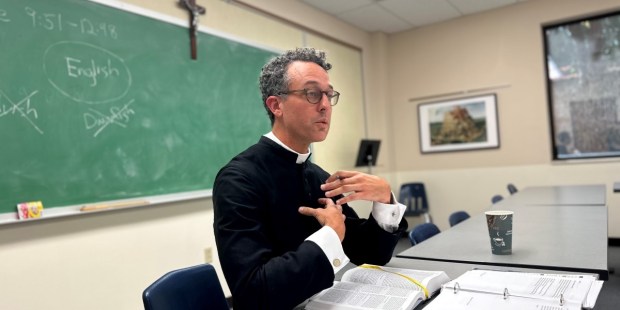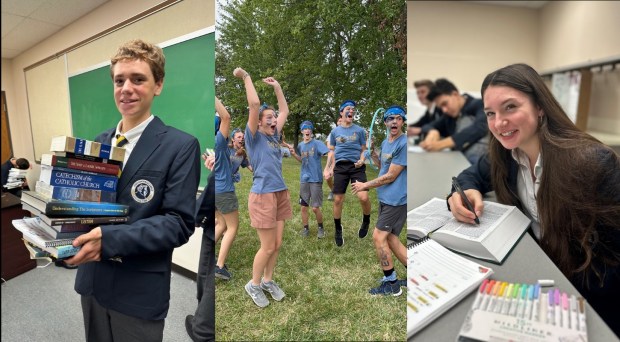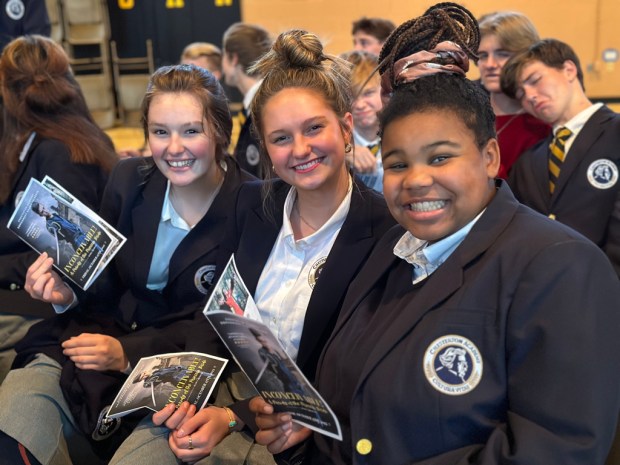Throughout my priestly ministry, I’ve dropped in on high school youth groups and parish catechism classes for the teenagers. I’ve always enjoyed spending time with the teens. When they’re together, they create an infectious atmosphere buzzing with energy and optimism. I always find myself energized by them.
I wonder if us adults, in fact, are in need of more interaction with younger generations. Not because we’re mature, elder guides with a responsibility to dispense wisdom, but because we, ourselves, as older people need to spend time with younger people for our own sake. They give just as much as they receive. It’s common to acknowledge the value of spending time with our elders, but it’s just as true that there’s value in spending time with younger generations. We all benefit from living in a diverse society in which all age groups have at least some interactions with the others.

An offer reluctantly accepted
This past year, I began teaching the sophomore theology class in the newly founded Chesterton Academy of St. Louis. I admit, initially I was reluctant to accept the offer to teach the class. Priests have busy schedules. We’re in short supply and requests to say Masses, speak to various groups, and lead retreats pile up fast. In addition, I was in the midst of transferring parishes as the school year was scheduled to start and always have my ongoing writing commitments. I didn’t want to add another obligation and find I lacked the ability to fulfill it.
I did agree to take the class, though, and my reluctance was ill-founded. Teaching has not been burdensome. In fact, I quite enjoy it. This isn’t because I’m some sort of magisterial, genius-level academic who takes great pride in my newfound authority. The joy of the class is entirely due to the students. They’ve been a revelation.
Here’s what I’ve learned from highschoolers this year and over the past years:
Integrity
If I say one thing and do another or say one thing and then waffle about it later, the teenagers will litigate me into oblivion. I know that, as adults, teachers, and parents, it’s frustrating when teens question literally every single thing we say, but it’s actually a good sign. It shows that they’re thinking. They’re questioning. They’re taking ownership of an idea to make it their own.
In my catechism and theology classes, I encourage the students to ask anything they want. I promise to take the question seriously. Of course, they can drive me up a wall with unrelenting quibbling over the answer to a question on a quiz or some minor offhand comment when I said something slightly different earlier, but I’m come to appreciate my group of amateur lawyers because of the underlying motive of their cross-examination – they’re searching for integrity. They want consistency in both word and deed. Sure, the students may moan that I’m too hard on them but if I behave with integrity, they respect it.
Caught in contradictions
To take one very powerful example: A priest friend of mine once pointed out to the parents of his students that, in catechism class, the teens would be learning that Sunday Mass is an obligation. Missing Sunday Mass is a mortal sin. He wants the parents to know that, if they then choose to skip Mass, their children will note the contradiction. This forces the children to choose between their parents and God. Often, this is the precise reason why teenagers lose interest in Mass. They’re caught in the contradiction between what their parents say they believe and what they actually do. The only way to resolve it with integrity and continue respecting their parents is to stop taking faith seriously.
We live in a world full of consumer marketing, salesmen working an angle, promise-breaking, scams, and those who say they’ll do one thing but then do another. This is exhausting. It’s bad for the soul. Teenagers are still in a phase of life when they demand more. They’re idealistic enough to strive for better. Maybe we adults should be a little more like them.

Authenticity
As the adult in the room, it’s not appropriate to let the students know everything about me as if I’m sharing information with a peer or a friend. A teacher must carefully maintain healthy boundaries. That said, it’s not the worst thing in the world to let the teens know a little bit about me. Over the years, discussions we’ve had during class have led me to reveal a (sanitized version) of my own struggles when I was a teenager, my battle with depression, and the questions I had about the Church when I was converting. I’ve found that teenagers truly value the authenticity of a teacher who doesn’t pretend to be something they’re not.
Further, they value a teacher who occasionally doesn’t know the answer to a question. More than once, I’ve had to go home and do research in order to come back with an answer the next day. I don’t mind telling the students if they’ve stumped me. It has never caused them to believe I don’t know the material.
My students actually seem proud if they confound me and appreciate if I take the time away from class to figure it out. A teacher or parent who pretends to know absolutely everything and never makes mistakes will quickly have the bluff called. Teenagers will sniff out the lack of authenticity very quickly. They’re in a formative stage of life and it helps them to know that adults went through growing pains, too, and in some small degree, are still trying to figure out how to make our way in the world.

Difficulty
Now that I’m middle-aged I’ve convinced myself I have the right to complain about “kids these days.” I tell my students long tales of woe about the decades when I was a child, how we didn’t have mobile phones, the internet, or Bluetooth, how we had to rent videos from a store and go to an arcade to play a video game. They humor me and shake their heads sadly.
Of course, the idea that kids these days have it easy and have become lazy is a myth. In my experience, highschoolers are eagerly receptive to difficult class topics and are willing to put in the work to figure out hard questions. If I ask them to think about a difficult saying of Christ or ponder a controversial teaching of the Church, they actually take the time to think and discuss. They have very few prejudices or hidden triggers that keep them from honestly examining questions. They aren’t predisposed to shrugging their shoulders and not caring from weariness. The more seriously I treat the class, the higher my expectations for their participation, the more they thrive. They don't want easy answers.
Bright days ahead
If I had to summarize everything I’ve learned from spending time with highschoolers, it’s that the future is bright. They’re going to make a great next generation and I can’t wait to see them grow into their fullest potential.

